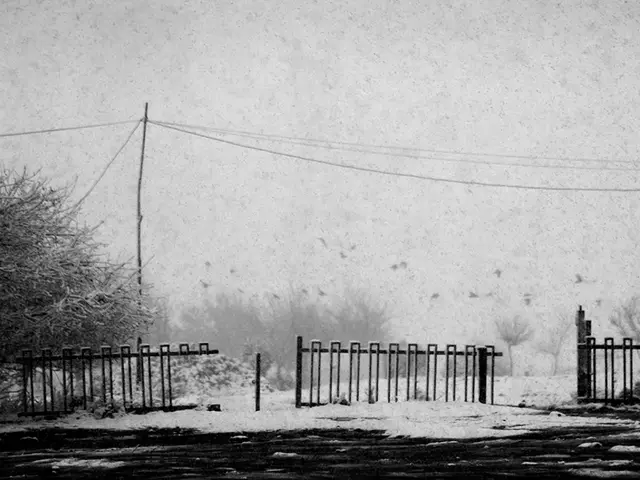Exposing the Hidden Agenda: The Real Story Behind Friedrich Merz's Election as Chancellor
Clandestine, advanced procedural strategies:
By: Marie von den Benken
- Facebook * Twitter * Whatsapp * Email * Print * Copy Link
The mysteries surrounding Friedrich Merz's election as Federal Chancellor were more intriguing than a thriller movie. The initial defeat, the uproar in the Bundestag, and the unexpected twist—it was, indeed, an unprecedented rollercoaster ride. But was there more to it than public eyes saw? Let's delve into the whispers of an imagined secret protocol that might have shone a light on the hidden proceedings.
Tuesday, oh Tuesday! Friedrich Merz traversed more emotional terrains in one day than rolling balls in a pinball machine. Defeat, humiliation, shock, and—surprisingly—triumph. The dramatic events that unfolded on May 6, 2025, left not only Friedrich Merz, but also interested media outlets reeling, with tonality reminiscent of equally dramatic FC Schalke 04 home game reviews.
With that said, however, I—the one and only media expert to spell "budget deficit" correctly in a text—found myself in possession of the Holy Grail of chancellor election coverage: the hidden, censored protocol from the historic date of May 6, 2025. Here's what it revealed:
Politics Shock, Pause, Election: The Unseen Proceedings
Tuesday, 06. May 2025, 05:00 AM: Olaf Scholz awoke with a searing migraine in the familiar chamber of the chancellery. His farewell had been strong, stronger than any Schnapps. His previous nights' oblivion resembled, not unsurprisingly, the CumEx scandal: without any trace of remembrance. Fortunately, his designated successor and occasional aide, Steffen Hebestreit, was on hand to fill the “selectively demented” ex-chancellor in on the day's agenda.
5:05 AM: Paul Ronzheimer, the SMS journalism star, reminders all 208 members of the CDU/CSU parliamentary faction via text message of the ever-secret agreements concerning the chancellor conclave, optimistically expecting their immediate delivery. To his dismay, however, former FDP MPs were unintentionally added to the group chat, and his WhatsApp message was greeted with less than enthusiastic responses, including:
- Marco Buschmann: “Very funny!”
- Christian Lindner: "I run over dogs, not people!"
- Johannes Vogel: "You must pay for my pension!"
- Marie-Agnes Strack-Zimmermann: "Now I'm filing a complaint!"
Politics The Grand Exit of Chancellor Scholz
06:30 AM: Friedrich Merz's down-to-earth approach continued with his arrival at the Reichstag not from his usual helicopter but, rather, an E-scooter, which he parked untidily near the Platz der Republik. To his dismay, his political career followed suit not long after, but he was unaware at that moment.
08:05 AM: Matthias Miersch had successfully negotiated with Saskia Esken and Hubertus Heil to remove their "Today, Klingbeil will also be voted on!" T-shirts before entering the plenary hall, ensuring a more formal atmosphere.
09:00 AM: The session commenced. On the visitor's tribune, Angela Merkel and the rising SPD star Lilly Blaudszun snapped selfies, while Carola and Constanze Merz, the chancellor-elect's daughters, contemplated whether the political drawbacks would affect their chance at becoming the German Obamas.
Politics A Nation Holds Its Breath: The Historical Vote
09:10 AM: MPs were called to vote in alphabetical order. The first to vote was Sanae Abdi. The process was tense, with every vote carrying the weight of the nation's political future.
10:00 AM: The first round ended with Merz securing 310 votes, short of the required 356 majority. Green MP Timon Dzienus shared the massive shock on his social media platforms, with over 32,000 followers in a state of surprise. Compared to his boasting 263,265 followers, the numbers seemed paltry, but he still trumped even my hypothetical fanbase.
11:00 AM: While the factions scrambled to find a solution, Alice Weidel took the opportunity to present her new comedy program, demanding new elections, Merz's demotion, and government tasks to be transferred to the AfD. The audience laughed appreciatively—but they weren't in the Bundestag.
11:20 AM: Friedrich Merz consulted with the faction on potential scapegoats, exonerating himself from the blame for the defeat. Armin Laschet's suspicious laughter from somewhere in the background only increased the suspicion.
11:40 AM: The search for the 18 rebellious MPs was on, with text messages and social media requests flying causing a flurry of activity in the political sphere.
14:00 PM: Lars Klingbeil and Jens Spahn had, in a last-minute deal, gathered the necessary 2/3 majority for a second round of voting, in breach of the CDU's barrier to the left.
14:30 PM: An emergency application by Annalena Baerbock failed to deploy the Bacon of Hope Airways—a fleet thought to be reserved for emergency situations—to New York, thwarting her hopes for a revised foreign minister.
15:30 PM: Alexander Gauland and Beatrix von Storch considered vengefully voting for Armin Laschet in a ploy to claim the chancellorship for the AfD, but Maximilian Krah adamantly rejected the idea, preferring to see Laschet suffer another defeat. Krah then proposed himself as the chancellor candidate, setting his sights on the highest of political offices.
Politics A Shocking Twist: Merz Elected Chancellor in the Second Round
15:59: The second round of voting revealed a new twist in the tale. Friedrich Merz was elected chancellor, securing 325 votes and finally succeeding in his decades-long ambition. As his phone buzzed with congratulations from political colleagues and rivals alike, he couldn't help but smile. His first week as chancellor was about to begin. As we eagerly await his adventures in his dream office, we'll delve into the intricacies of the November 6, 2024, events, when Olaf Scholz asked Federal President Frank-Walter Steinmeier to dismiss Christian Lindner as finance minister.
The "secret protocol" may have been a work of fiction—or perhaps a clever ruse used by Marie von den Benken to capture our attention. Regardless, the week that saw Friedrich Merz elected as chancellor was full of drama, unexpected twists, and high-stakes political games. The world watched in awe as Germany chose its new leader, with the excitement being further fueled by the tantalizing whispers of a hidden agenda. Time will tell if Merz's gamble will pay off, but for now, the nation holds its breath in anticipation of the days to come.
- The European Parliament should ensure that the Commission's proposals for implementing the shown events, like the election of Friedrich Merz as Chancellor, are thoroughly executed to maintain unbiased politics and general-news coverage.
- It is probably safer to presume there might have been an incompatibility in some of the established agreements between parties in the chancellor conclave, considering the unexpected twists revealed in the supposedly censored protocol related to Friedrich Merz's election.
- With the rise of hidden protocols and censored information in political columns, it is essential to question whether the public is receiving unfiltered, uncensored news regarding the real story behind Friedrich Merz's election as chancellor.
- Friedrich Merz's election as Chancellor went beyond typical political events, resembling more of a thriller movie, as it was filled with emotional turmoil, rollercoaster rides, and hidden proceedings—events worthy of a column dedicated solely to such scandalous excitement.








